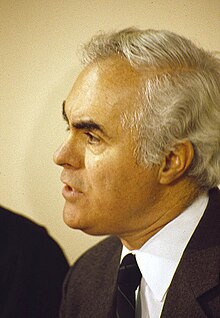Robert P. Casey
Robert Patrick "Bob" Casey Sr. (born January 9, 1932 in Queens , New York , † May 30, 2000 in Scranton , Pennsylvania ) was an American politician who served in various positions for the US state of Pennsylvania. Mainly through his work as the 42nd governor of the state from 1987 to 1995, he became known to a wider public.
Early years
Born in Jackson Heights, New York, Bob Casey grew up in Scranton, Pennsylvania. In 1953 the College of the Holy Cross awarded him a BA (Bachelor of Arts). After studying law at George Washington University in Washington, DC , he was admitted to the bar in 1956. In the following years he practiced in Washington before he returned to Scranton in the early 1960s.
Political rise
Casey was a member of the Democratic Party . Between 1963 and 1967 he was a member of the Pennsylvania Senate . From 1967 to 1968 he was vice-president of a commission for the revision of the state constitution. In 1966, 1970 and 1978 he ran for his party's nomination for governor. But he failed every time in the primaries. Between 1969 and 1977 Casey was the Auditor General of Pennsylvania. During this time, he uncovered some wasted money and corruption, and saved the state several million dollars by better monitoring government spending. Due to a constitutional clause, Casey could not seek a third consecutive term in this office in 1977 and therefore had to give it up. He then worked as a lawyer in a large law firm for a few years. In 1986 he ran again for the nomination of his party for the office of governor and this time he prevailed. He then managed to win the actual gubernatorial elections.
Governor of Pennsylvania

Casey took up his new position on January 20, 1987. After being re-elected in 1990, he could remain in office until January 17, 1995. During this time, Pennsylvania saw an economic transition from heavy industry to electronics and service providers. The steel industry lost ground as modern technologies made their entrance. Even so, the state suffered from a recession in the early 1990s, which led to an increase in unemployment. As a result, Pennsylvania ran the largest budget deficit of the 20th century. The governor responded with job creation measures. This included the further expansion of the infrastructure such as B. the highways. Environmental protection and especially water protection were important to the governor. Among other things, the nationwide largest recycling program was set up in Pennsylvania. Improvements and preliminary studies have been introduced in the health sector. An abortion law was later dismissed as unconstitutional by the US Supreme Court.
Another résumé
During his tenure as governor, Casey was diagnosed with amyloidosis , a rare genetic disease that destroys organs in the body. In June 1993, he had a heart-liver transplant to fight the disease. For about six months he had to be represented by Lieutenant Governor Mark Singel . When Singel ran for governor in 1994, Casey refused to give him any support due to a disagreement between the two men over the abortion issue. Casey's behavior contributed to Singel's electoral defeat. Casey originally planned to run for the presidency in 1996. Due to his illness, however, he had to give up this plan. He finally succumbed to his illness on May 30, 2000. Robert Casey was married to Ellen Harding, with whom he had eight children. His eldest son Robert also became a politician and has been a member of the US Senate for Pennsylvania since 2007 .
Web links
- The governors of Pennsylvania (English)
- Robert P. Casey in the database of the National Governors Association (English)
- Robert P. Casey in the database of Find a Grave (English)
- Robert P. Casey in nndb (English)
- The governors of Pennsylvania (English)
| personal data | |
|---|---|
| SURNAME | Casey, Robert P. |
| ALTERNATIVE NAMES | Casey, Bob (nickname); Casey Robert Patrick (full name) |
| BRIEF DESCRIPTION | American politician |
| DATE OF BIRTH | January 9, 1932 |
| PLACE OF BIRTH | Queens , New York |
| DATE OF DEATH | May 30, 2000 |
| Place of death | Scranton , Pennsylvania |

